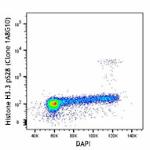- Clone
- 5D10D4 (See other available formats)
- Regulatory Status
- RUO
- Other Names
- Histone-H3
- Isotype
- Rat IgG2a, κ
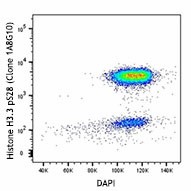
-

HeLa cells were stimulated with (top) or without (bottom) nocodozole for 24 hours, fixed and permeabilized with cold 70% ethanol, then intracellularly stained with DAPI and Histone H3.1 Phospho (Ser28) antibody (clone 5D10D4) Alexa Fluor® 647. -

| Cat # | Size | Price | Quantity Check Availability | ||
|---|---|---|---|---|---|
| 687603 | 25 tests | $206.00 | |||
| 687604 | 100 tests | $452.00 | |||
Histone proteins are classified into core histones (H2A, H2B, H3, H4) and linker histones (H1, H5). Core histones form an octamer, which contains two H2A-H2B dimers and one H3-H4 tetramer. Core histones are predominantly globular except for the unstructured N-terminal tails. Posttranslational modifications, such as acetylation, methylation, phosphorylation, ubiquitination, SUMOylation and ADP-ribosylation occur in histone tails.
Histone modifications induce changes of chromatin structure and thereby affect the accessibility of transcription factors, nuclear proteins and enzymes to genomic DNA, resulting in gene activation or repression. It is known that histone modifications play critical roles in DNA repair, DNA replication, transcription regulation, alternative splicing and chromosome condensation and some diseases including autoimmune diseases and cancers.
Product Details
- Verified Reactivity
- Human
- Antibody Type
- Monoclonal
- Host Species
- Rat
- Immunogen
- Histone H3.1 S28ph peptide (21-39)(ATKAARK(phS)APATGGVKKPH), Freund's complete adjuvant.
- Formulation
- Phosphate-buffered solution, pH 7.2, containing 0.09% sodium azide and BSA (origin USA)
- Preparation
- The antibody was purified by affinity chromatography and conjugated with Alexa Fluor® 647 under optimal conditions.
- Concentration
- Lot-specific (to obtain lot-specific concentration and expiration, please enter the lot number in our Certificate of Analysis online tool.)
- Storage & Handling
- The antibody solution should be stored undiluted between 2°C and 8°C, and protected from prolonged exposure to light. Do not freeze.
- Application
-
ICFC - Quality tested
- Recommended Usage
-
Each lot of this antibody is quality control tested by intracellular immunofluorescent staining with flow cytometric analysis. For flow cytometric staining, the suggested use of this reagent is 5 µl per million cells in 100 µl staining volume or 5 µl per 100 µl of whole blood.
* Alexa Fluor® 647 has a maximum emission of 668 nm when it is excited at 633 nm / 635 nm.
Alexa Fluor® and Pacific Blue™ are trademarks of Life Technologies Corporation.
View full statement regarding label licenses - Excitation Laser
-
Red Laser (633 nm)
- RRID
-
AB_2616946 (BioLegend Cat. No. 687603)
AB_2616946 (BioLegend Cat. No. 687604)
Antigen Details
- Structure
- H3 is part of the nucleosome, comprised of an octameric complex with H2A, H2B, and H4 proteins.
- Distribution
-
Nucleus.
- Function
- H3 is a core component of the nucleosome that serves to wrap and compact DNA into chromatin. Therefore, histones limit the accessibility of DNA by providing mechanisms for transcription regulation, DNA repair and replication and chromosomal stability.
- Interaction
- Two molecules of H3 form a heterotetramer with two molecules of H4.
- Biology Area
- Cell Biology, Cell Cycle/DNA Replication, Cell Proliferation and Viability
- Molecular Family
- Phospho-Proteins
- Antigen References
-
1. Choi HS, et al. 2005. J. Biol. Chem. 280:13545.
2. Goto H, et al. 2002. Genes Cells 7:11.
3. Garcia BA, et al. 2005. Biochemistry 44:13202.
4. Yoshimi T, et al. 2013. Monoclon. Immunodiagn. Immunother. 32:119. - Gene ID
- 8350 View all products for this Gene ID
- UniProt
- View information about Histone on UniProt.org
Other Formats
View All Histone Reagents Request Custom Conjugation| Description | Clone | Applications |
|---|---|---|
| Purified anti-Histone H3.1 Phospho (Ser28) | 5D10D4 | ICFC,WB,ChIP,Direct ELISA,ICC |
| Alexa Fluor® 647 anti-Histone H3.1 Phospho (Ser28) | 5D10D4 | ICFC |
Compare Data Across All Formats
This data display is provided for general comparisons between formats.
Your actual data may vary due to variations in samples, target cells, instruments and their settings, staining conditions, and other factors.
If you need assistance with selecting the best format contact our expert technical support team.
-
Purified anti-Histone H3.1 Phospho (Ser28)
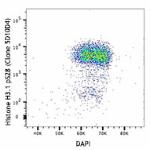
HeLa cells were stimulated with (top) or without (bottom) no... 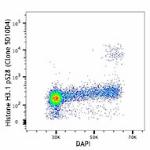
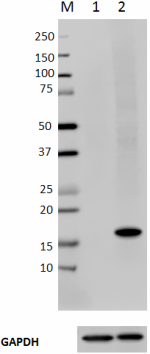
Total lysates (15 µg protein) from HeLa (lane 1) and HeLa ce... 
Chromatin Immunoprecipitation (ChIP) was performed using com... -
Alexa Fluor® 647 anti-Histone H3.1 Phospho (Ser28)
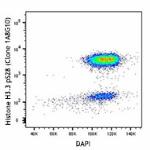
HeLa cells were stimulated with (top) or without (bottom) no... 